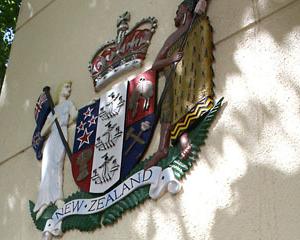The Judicial Conduct Commissioner, Sir David Gascoigne, has recommended to the Attorney-general that a Judicial Conduct Panel be set up to examine allegations involving the actions of Supreme Court Justice Bill Wilson.
To recap, the commissioner's job is to carry out a preliminary investigation into any complaint about a judge's conduct.
Provided the commissioner finds that the complaint has some factual basis and goes beyond the trivial, he then must decide what response he thinks is warranted.
If the complained of behaviour simply requires a stern telling off or counselling, the commissioner hands it over to that judge's head of bench - effectively her or his manager - to deal with.
But if it is serious enough that it "may warrant consideration of removal of the judge", then the commissioner recommends to the Attorney-general that a Judicial Conduct Panel be established to investigate whether or not the judge should get sacked.
If that panel decides that the conduct occurred, and that it justifies the judge's removal, then it recommends this course to the Attorney-general.
While it is for the Attorney-general, and ultimately Parliament, to act on that recommendation, there's very little chance that it would ever fail to do so.
Consequently, the panel's investigation and findings effectively will decide the matter's outcome.
The particular complaint against Justice Wilson stemmed from a case he sat on when a member of the Court of Appeal, where he had an ongoing business relationship with counsel for the successful party.
His decision not to step down from the case then was the subject of two rulings by Justice Wilson's colleagues on the Supreme Court.
The first ruling upheld that decision.
The second, made after further information about the extent and nature of the business relationship came to light, found that he should have stood down because the relationship could raise the appearance of bias on his part.
Justice Wilson's failure to recuse himself, as well as what he told the other side and subsequently his colleagues about the relationship, formed the basis of complaints to the commissioner.
Sir David now has told the Attorney-general there is enough substance to them that the matter requires further examination by a Judicial Conduct Panel.
But, and it is a significant but, the grounds on which the commissioner has made that recommendation are relatively narrow.
Of all the allegations of conflicted interests and possible duplicity thrown at Justice Wilson, the only one that the commissioner thinks needs further exploration is the extent and adequacy of his disclosures to his Supreme Court colleagues when they first ruled on his potential conflict of interest.
In other words, what needs looking into is "what did Justice Wilson know, when did he know it, and why didn't he tell his colleagues sooner?" Furthermore, the commissioner notes that he is recommending a panel be established because he cannot reach a conclusive answer on these questions.
He does not have the power to, for instance, put witnesses under oath, or to demand that documents be presented to him.
Therefore, the commissioner expresses no real opinion as to whether the panel will find anything to justify removing Justice Wilson from office: "On further inquiry, and in the exercise of its judgement about Justice Wilson's conduct and the context in which it occurred, a Judicial Conduct Panel may well form a view which is favourable to the judge, but a different view is possible."
This is code for saying that it may transpire that Justice Wilson's colleagues on the court were misinformed through a regrettable misunderstanding, but it also may be that they were led astray in a more deliberate fashion.
And obviously that is a question that does need to be resolved in the public forum of a Judicial Conduct Panel, if only to clear the air between the members of the Supreme Court bench.
Now that the commissioner has announced his recommendation, it's certain that the Attorney-general will follow it.
No Attorney-general could justifiably second guess the commissioner's conclusion on a matter as important as this.
And the fact that the present occupant of that post, Chris Finlayson, used to be a colleague in Justice Wilson's former law firm makes it even more important that he be seen to act in a scrupulously correct manner.
While this Judicial Conduct Panel process may be somewhat embarrassing for Justice Wilson - it does, after all, amount to a public trial for impropriety - it also is important that this process be left to run its course.
To reiterate, the fact that a panel will be asked to review Justice Wilson's conduct does not mean that there has been wrongdoing on his part.
It simply means that there is sufficient uncertainty as to whether he acted wrongly that an inquiry in the public's view is needed to resolve the matter conclusively.
Unless and until the panel finds that actual wrongdoing did take place, it would be wrong to call for Justice Wilson's resignation.
Unlike elected political figures, a judge's fate ought not to be governed by the public's opinion because they need to be able to make unpopular decisions when required to do so by the law.
So as my colleague Richard Cornes previously has argued with respect to Justice Wilson's case: "The constitutional imperative of judicial independence requires that no judge should be hounded from their court on the basis of media pressure."
In other words, let's allow justice to be seen to be done, even to a justice.
• Andrew Geddis is associate professor of law at the University of Otago.











